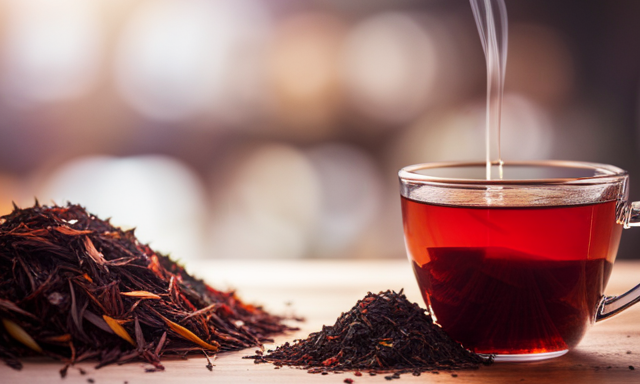As I sit here, sipping on a warm cup of rooibos tea, I can’t help but marvel at the rich, earthy flavor and the soothing aroma that fills the air. But what truly fascinates me about this herbal infusion is its powerful antioxidant properties.
You see, antioxidants are like the superheroes of our bodies, protecting us from the harmful effects of oxidative stress. And rooibos tea happens to contain a specific antioxidant that has been the subject of much scientific research and interest.
In this article, we will explore the world of antioxidants and dive deep into the specific antioxidant found in rooibos. We will uncover its potential health benefits and understand how it works to prevent oxidative stress. Additionally, we will delve into the studies and research that have been conducted on this remarkable antioxidant.
So, if you’re curious to learn more about the antioxidant in rooibos and how it can benefit your health, join me on this informative journey. Together, we will uncover the secrets of this incredible herbal tea and discover ways to incorporate it into our daily lives.
Key Takeaways
- Rooibos tea contains antioxidants, specifically polyphenols and flavonoids.
- The antioxidants in rooibos tea help protect cells from oxidative stress and reduce inflammation.
- Rooibos tea antioxidants may have potential benefits for heart health, such as lowering blood pressure.
- It is important to consult with a healthcare professional before consuming rooibos tea, as it can have potential side effects and interactions with medications.
The Antioxidant Found in Rooibos Tea
You’ll be thrilled to know that rooibos tea contains a powerful antioxidant called aspalathin. This antioxidant has been shown to have a number of health benefits, including boosting metabolism and promoting skin health. Aspalathin works by neutralizing harmful free radicals in the body, which can cause oxidative stress and damage to cells. By doing so, it helps to protect against chronic diseases and slow down the aging process.
Studies have also suggested that aspalathin may have anti-inflammatory properties, further contributing to its potential health benefits. In addition to its antioxidant properties, rooibos tea is also rich in vitamins and minerals, making it a nutritious beverage choice.
Transitioning into the subsequent section about the health benefits of rooibos tea, it’s clear that this antioxidant-rich tea has a lot to offer in terms of overall well-being.
The Health Benefits of Rooibos Tea
Rooibos tea has been shown to have numerous health benefits, making it a great addition to a balanced diet. One of its key benefits is its ability to boost the immune system. Research has suggested that the antioxidants present in rooibos tea can help strengthen the body’s defenses against infections and diseases.
Additionally, regular consumption of rooibos tea has been associated with supporting heart health by reducing the risk of cardiovascular diseases. Its anti-inflammatory properties have also been linked to fighting inflammation in the body, which can help alleviate symptoms of chronic conditions.
Boosting the Immune System
By incorporating rooibos into your daily routine, you can enhance your body’s natural defense system and experience a strengthened immune system. Rooibos tea is rich in antioxidants, which play a crucial role in boosting the immune system. These antioxidants help to neutralize harmful free radicals in the body, reducing oxidative stress and inflammation.
Here are five ways rooibos tea can boost your immune system:
- Boosts energy levels: Rooibos contains minerals like magnesium and iron that help support energy production in the body.
- Improves digestion: Rooibos tea has a soothing effect on the digestive system, reducing inflammation and promoting healthy digestion.
- Supports liver function: The antioxidants in rooibos tea can help support liver health and detoxification processes.
- Enhances nutrient absorption: Rooibos tea contains compounds that can enhance the absorption of essential nutrients, further supporting overall health and immune function.
- Reduces stress: Chronic stress can weaken the immune system, and rooibos tea has calming effects, helping to reduce stress levels.
Incorporating rooibos tea into your daily routine can not only boost your immune system but also support heart health.
Supporting Heart Health
Incorporating rooibos tea into your daily routine can not only boost your immune system but also support and promote heart health. Rooibos tea contains various antioxidants, including aspalathin and nothofagin, which have been shown to have cardiovascular health benefits. These antioxidants help to protect the heart and blood vessels from damage caused by oxidative stress and inflammation, both of which play a role in the development of heart disease. Additionally, rooibos tea has been found to lower blood pressure and reduce the risk of heart disease by improving blood lipid profiles. A study conducted on rats even showed that rooibos tea was able to prevent heart damage caused by a high-fat diet. So, by enjoying a cup of rooibos tea daily, you can take a proactive step towards preventing heart disease and promoting cardiovascular health. Now, let’s delve into how rooibos tea aids in fighting inflammation.
Fighting Inflammation
Fighting inflammation is crucial for maintaining overall health and well-being. Rooibos, a South African herbal tea, contains a powerful antioxidant called aspalathin that’s been found to have anti-inflammatory properties.
Here are three important benefits of the rooibos antioxidant:
-
Reduces oxidative stress: Aspalathin in rooibos helps neutralize harmful free radicals in the body, reducing oxidative stress and inflammation.
-
Protects against chronic diseases: Chronic inflammation is linked to various diseases like heart disease, diabetes, and cancer. By fighting inflammation, rooibos may help protect against these conditions.
-
Supports a healthy immune system: Inflammation is a natural response of the immune system, but chronic inflammation can weaken immune function. Rooibos antioxidant can help modulate the immune response, promoting a healthy immune system.
Understanding antioxidants and their role in overall health is essential. By exploring the benefits of rooibos in fighting inflammation, we can gain a deeper understanding of how antioxidants can positively impact our well-being.
Understanding Antioxidants
Did you know that rooibos contains a significant amount of antioxidants, which help protect your body from harmful free radicals?
In fact, studies have shown that rooibos has up to 50% more antioxidants than green tea, making it a powerful source of these beneficial compounds.
Antioxidants play a crucial role in neutralizing free radicals, which are unstable molecules that can cause damage to cells and contribute to various diseases, including inflammation.
By scavenging these free radicals, antioxidants help reduce inflammation and promote overall health.
Understanding antioxidants and their role in our bodies is essential for maintaining optimal well-being.
Now, let’s delve deeper into the specific antioxidant in rooibos and how it contributes to its health benefits.
The Specific Antioxidant in Rooibos
Rooibos boasts a powerful compound that actively protects your body against harmful free radicals. This compound, known as aspalathin, is an antioxidant that has shown potential health benefits. Aspalathin helps to neutralize free radicals, which are unstable molecules that can cause damage to cells and contribute to the development of chronic diseases.
Research has suggested that aspalathin may have anti-inflammatory properties and could potentially play a role in preventing certain types of cancer. Rooibos is one of the few natural sources of aspalathin, making it a valuable addition to a healthy diet. Other potential sources of this antioxidant include certain fruits and vegetables, such as apples and onions.
Understanding the role of antioxidants in preventing oxidative stress is crucial for maintaining overall health and well-being.
The Role of Antioxidants in Preventing Oxidative Stress
The specific antioxidant in rooibos, as mentioned earlier, is aspalathin. Now, let’s delve into the role of antioxidants in preventing oxidative stress.
Oxidative stress occurs when there is an imbalance between the production of harmful molecules called free radicals and the body’s ability to neutralize them with antioxidants. Free radicals are highly reactive and can damage cells and DNA, leading to various health issues.
Antioxidants play a crucial role in protecting our cells from this damage by neutralizing these free radicals. Research on antioxidants has shown promising results in preventing chronic diseases, such as heart disease, cancer, and neurodegenerative disorders.
Understanding the mechanisms by which antioxidants combat oxidative stress is vital for developing strategies to improve human health.
Moving forward, let’s explore the potential health effects of the rooibos antioxidant.
Potential Health Effects of Rooibos Antioxidant
Imagine yourself sipping on a warm cup of rooibos tea, feeling a sense of calm wash over you as the vibrant red liquid nourishes your body like a soothing balm for your cells, protecting them from the damaging effects of oxidative stress.
Rooibos is known for its high antioxidant content, including polyphenols and flavonoids, which have been shown to have numerous potential health benefits. Research suggests that these antioxidants may help reduce inflammation, lower blood pressure, and improve heart health. Additionally, rooibos antioxidant has been found to have potential benefits for skin conditions like eczema and acne.
However, it is important to note that while rooibos is generally considered safe, some individuals may experience allergic reactions or interactions with certain medications. Further studies and research on rooibos antioxidant are needed to fully understand its effectiveness and potential side effects.
Transitioning into the subsequent section, studies and research have shed light on the various properties and potential applications of this remarkable antioxidant compound.
Studies and Research on Rooibos Antioxidant
As you delve into the world of rooibos tea, you’ll be captivated by the intriguing studies and research surrounding its potential health benefits. Numerous studies have been conducted to investigate the effectiveness of rooibos antioxidant in promoting health.
These studies have shown that rooibos tea has powerful antioxidant properties that help protect cells from damage caused by free radicals. Additionally, research suggests that rooibos tea may have anti-inflammatory and antimicrobial effects. However, it’s important to note that more research is needed to fully understand the potential health benefits of rooibos tea and its antioxidant component.
While rooibos tea is generally considered safe to consume, some individuals may experience allergic reactions or interact with certain medications. It’s always recommended to consult with a healthcare professional before incorporating any new supplement into your diet.
Transitioning into the subsequent section, let’s explore how to incorporate rooibos tea into your daily routine.
How to Incorporate Rooibos Tea into Your Diet
After learning about the studies and research on the antioxidant properties of rooibos tea, it is intriguing to explore how we can incorporate this beneficial beverage into our daily diet. Drinking rooibos tea offers a range of health benefits, thanks to its rich antioxidant content. These antioxidants, including aspalathin and nothofagin, help protect our cells from damage caused by free radicals and may reduce the risk of chronic diseases such as heart disease and cancer. Incorporating rooibos tea into your diet is easy and enjoyable. You can simply swap your regular cup of black tea or coffee with a refreshing cup of rooibos tea. Additionally, you can use rooibos tea as an ingredient in various recipes, such as smoothies, marinades, and even desserts, to add a unique flavor profile and reap its health benefits. Transitioning into the next section about precautions and considerations, it is important to understand the potential side effects and interactions of rooibos tea.
Precautions and Considerations
Before incorporating rooibos tea into your diet, there are a few precautions and considerations you should keep in mind. It’s important to consult with a healthcare professional, especially if you have underlying health conditions or are taking medications. Rooibos tea is generally safe, but it may interact with certain medications or worsen pre-existing conditions. Start with a small amount and gradually increase the dosage to assess your tolerance and potential side effects. Keep in mind that rooibos tea contains tannins, which can interfere with nutrient absorption. Therefore, it’s best to consume rooibos tea between meals rather than with meals. These precautions and considerations will help ensure the safe and effective incorporation of rooibos tea into your diet. Let’s now discuss the conclusion and final thoughts.
Conclusion and Final Thoughts
In conclusion, incorporating rooibos tea into your diet can be a delightful and beneficial addition to your daily routine. Rooibos tea contains a variety of antioxidants that can help protect your body against oxidative stress and inflammation. These antioxidants, such as aspalathin and nothofagin, have been shown to have potential health benefits, including reducing the risk of chronic diseases like heart disease and cancer.
However, it’s important to note that excessive consumption of rooibos tea may lead to potential side effects, such as liver damage and allergic reactions. Therefore, it’s recommended to consume rooibos tea in moderation and follow the recommended daily intake guidelines.
As with any dietary supplement, it’s always best to consult with a healthcare professional before making any significant changes to your diet.
Frequently Asked Questions
Are there any side effects or risks associated with consuming rooibos tea?
I haven’t experienced any side effects from drinking rooibos tea. It’s known to have numerous health benefits, such as improving heart health and reducing inflammation. Research suggests it’s generally safe to consume.
Can rooibos tea help with weight loss or managing diabetes?
Rooibos tea has been studied for its potential weight loss benefits and effectiveness in managing diabetes. Research suggests that its compounds may help regulate blood sugar levels and aid in weight management, but more studies are needed to confirm these effects.
How does the antioxidant in rooibos tea compare to antioxidants in other types of tea?
The antioxidant in rooibos tea has been found to have higher levels of polyphenols compared to other types of tea. These polyphenols contribute to its health benefits, including improved heart health and reduced inflammation.
Is it safe to consume rooibos tea during pregnancy or while breastfeeding?
Rooibos tea is generally considered safe to consume during pregnancy and breastfeeding. It may provide benefits for postpartum recovery and potentially promote babies’ health. However, it is always best to consult with a healthcare professional before making any dietary changes during this time.
Can rooibos tea be used topically for skin health or as a natural remedy for certain conditions?
Rooibos tea has topical benefits for skin health and can be used as a natural remedy for certain conditions. It is packed with antioxidants that help protect the skin and promote healing.
Conclusion
In conclusion, incorporating rooibos tea into your diet can be a powerful way to harness the benefits of antioxidants. It’s specific antioxidant, aspalathin, has been shown to combat oxidative stress and support overall health. With its rich and earthy flavor, rooibos tea is a delightful addition to any routine. Remember to consult with your healthcare provider before making any significant changes to your diet.
So, sip on this antioxidant-packed elixir and let its healing powers flow through your body like a mighty river.










